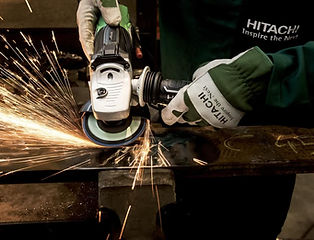WHAT WE OFFER
QUALITY STEEL SOLUTIONS FOR EVERY PROJECT
With industry-recognised accreditations, including CE Marking to BS EN 1090, every product is supplied and fabricated to the highest standards of quality and compliance. Our services cover fabrication, sawing, flame cutting, drilling, painting, galvanising, and light fabrication, ensuring steel is ready to use on site. We proudly support projects across Ashton-under-Lyne, Stockport, Altrincham, Rochdale, Bury, and Bolton, delivering dependable solutions for builders, contractors, engineers, and industrial clients. From supply to finishing and delivery, every stage is carried out with precision and care, backed by over four decades of expertise. Whatever the scale of your project, you can rely on trusted service, competitive pricing, and steel that is prepared to perform.

WHY CHOOSE US?
-
OVER 40 YEARS OF EXPERIENCE: Trusted by builders, engineers, and industrial clients since 1980.
-
RELIABLE DELIVERIES: Fast and dependable service across the North West and Yorkshire.
-
HIGH-QUALITY MATERIALS: Only steel for your projects.
-
EXPERT ADVICE: Our team is here to guide you every step of the way.
-
SUSTAINABILITY FOCUS: Offering new and reusable steel options.
-
COMPETITIVE PRICING: Quality steel solutions that fit your budget.
UNIQUE SELLING PROPOSITIONS
EXTENSIVE KNOWLEDGE
Our years of expertise ensure professional results across every project.
RELIABLE SERVICE
We deliver dependable solutions you can count on, every time.
HIGHEST STANDARDS
We uphold exceptional quality in all our work, with attention to detail that lasts.
STRONG STOCK PROFILE
As a leading steel supply company in Oldham, James Dunkerley Steels maintain a wide selection of beams, columns, plates, and sections. Our extensive stock ensures fast turnaround, helping your project stay on schedule without compromise.
PRECISION ON EVERY ORDER
With our custom steel solutions and accurate cutting services, every order is prepared to the exact specification you need—including custom steel fabrication when required—so materials arrive site-ready and hassle-free.
Built For Tough Work
All our steel products are sourced for strength and consistency, delivering dependable performance in demanding environments and supporting safe, durable construction across Oldham and beyond.
LOCAL PRESENCE, NATIONAL CAPACITY
James Dunkerley Steels provides quick access to a strong and versatile stock range, ready for both collection and delivery. From beams and columns to plates and hollow sections, our products support every stage of construction and fabrication work.
When standard sizes aren’t enough, we offer custom steel solutions tailored to your project requirements, including custom steel fabrication for materials that need to arrive site-ready. With decades of experience supplying steel across Oldham and surrounding areas, we focus on dependable quality, competitive availability, and steel that performs where it matters most. Contact us now to secure the steel you need and keep your project on track.
Frequently Asked Questions (FAQs)
What types of steel products do you supply in Oldham?
We stock a wide range of steel sections, including beams, columns, plates, hollow sections, flats, angles, and merchant bars. Both standard sizes and custom-cut options are available to suit a variety of construction and fabrication projects.
Do you offer custom steel solutions?
Yes, we provide custom steel solutions, including precision cutting, drilling, and preparation to perfectly match your exact project requirements. We can also handle custom steel fabrication, delivering fully site-ready components tailored to your specifications.
Can I collect steel directly from your Oldham location?
Absolutely. Our centrally located stockyard in Oldham allows for fast collection of standard stock items, and our team can help arrange tailored orders for pickup as well.
Do you deliver steel to project sites?
Yes, we offer reliable delivery across Oldham and surrounding areas. Whether you need single items or large orders, we coordinate logistics carefully to ensure your steel arrives safely, on time, and in perfect condition, ready for immediate use on site.
What industries do you supply steel to?
We supply steel to a variety of industries, including construction, engineering, fabrication, and domestic building projects. Our stock and custom solutions cater to both small-scale and large-scale projects.
How do I request a quote for custom steel fabrication?
You can contact our Oldham office with your drawings, dimensions, or specifications. Our experienced team will review your requirements and provide a tailored quote for the materials and fabrication services you need.


























